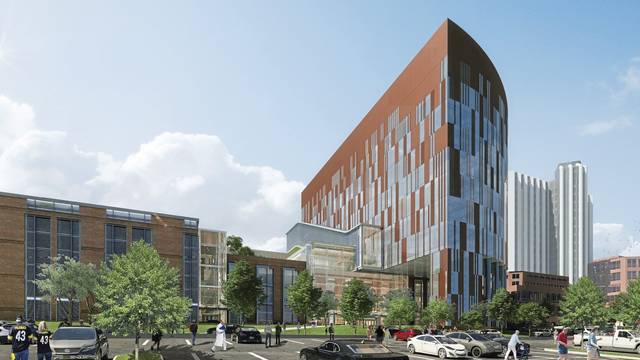UPMC broke ground Thursday on its new $400 million vision and rehabilitation facility at Mercy Hospital.
UPMC officials and doctors and local dignitaries gathered at Mercy in Pittsburgh’s Uptown neighborhood to celebrate the nine-story tower with views of the city skyline and Monongahela River. The project scheduled for completion in 2022 is part of a systemwide expansion that UPMC announced in 2017.
“This new building will change the way vision and rehabilitation care is provided in the region, incorporating clinical and research excellence in an uncommon way,” said Michael A. Grace, president of UPMC Mercy. “UPMC Mercy is the last Catholic hospital in the region. The work that we do every day would not be possible without the support of our sponsoring partner the Diocese of Pittsburgh.”
The facility along Locust Street between Marion and Van Braam Streets will be headed by headed by a world-renowned ophthalmologist, Dr. José-Alain Sahel. Surgical and clinical facilities will be on the first four floors with space for clinical and academic research on the top five floors.
It will include a full-sized model of an apartment and street lab where patients participate in simulations teaching them critical life skills. It will also include an optical shop, pharmacy, therapy stations and a rehabilitation gym.
A pedestrian bridge will connect the building to Mercy Hospital.
Dr. Gwendolyn A. Sowa, director of UPMC’s Rehabilitation Institute, said the hospital would treat all kinds of disabilities, including patients with visual, mobility and cognitive impairments.
“The new tower will be accessible to everyone and also have a very strong research infrastructure with innovations and new ways of taking care of patients,” Sowa said.
UPMC President and CEO Jeffrey A. Romoff said the health giant would preserve Mercy Hospital and help it thrive well into the future. Romoff noted that Mercy was on the verge of closing when UPMC absorbed it into its system about 10 years ago.
“Vision and rehabilitation have been somewhat of a periphery of modern medicine,” Romoff said. “What used to be the last act of the medical system — the restoration of vision, the restoration of mobility or activities — is now going to become the first act. Medicine has radically changed. We are now in the world of taking care of our seniors, me included.”
Bishop David Zubik of the Catholic Diocese of Pittsburgh said the new hospital would offer innovation and healing to anyone in need.
“I think this project certainly secures the presence of Mercy well into the future, and I think it’s really important for our region and us as a church to have our presence in the medical field,” he said.








